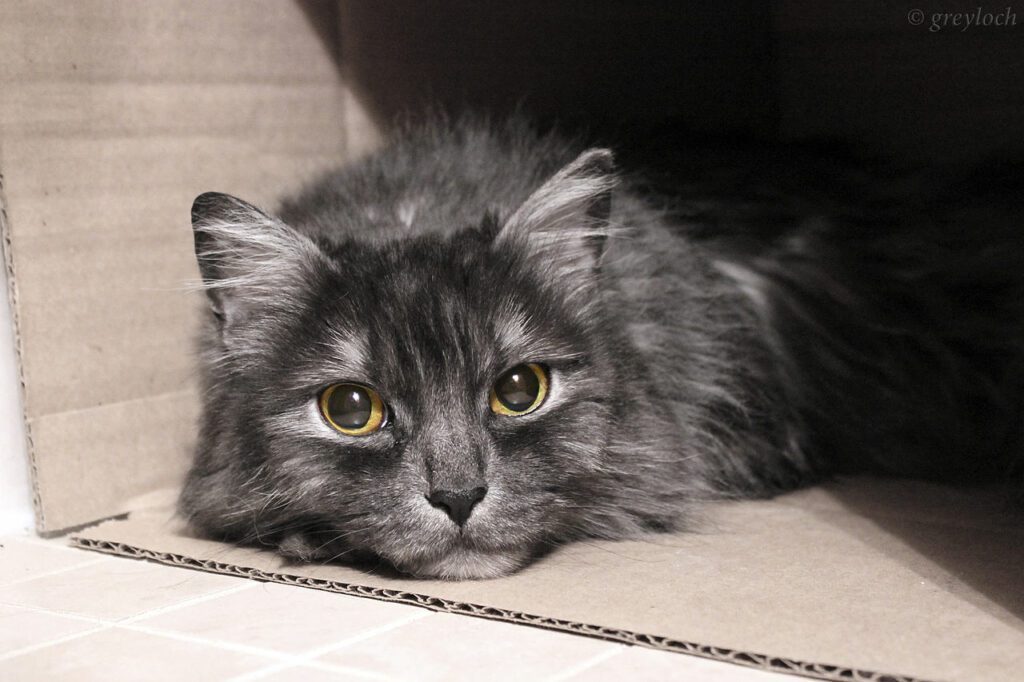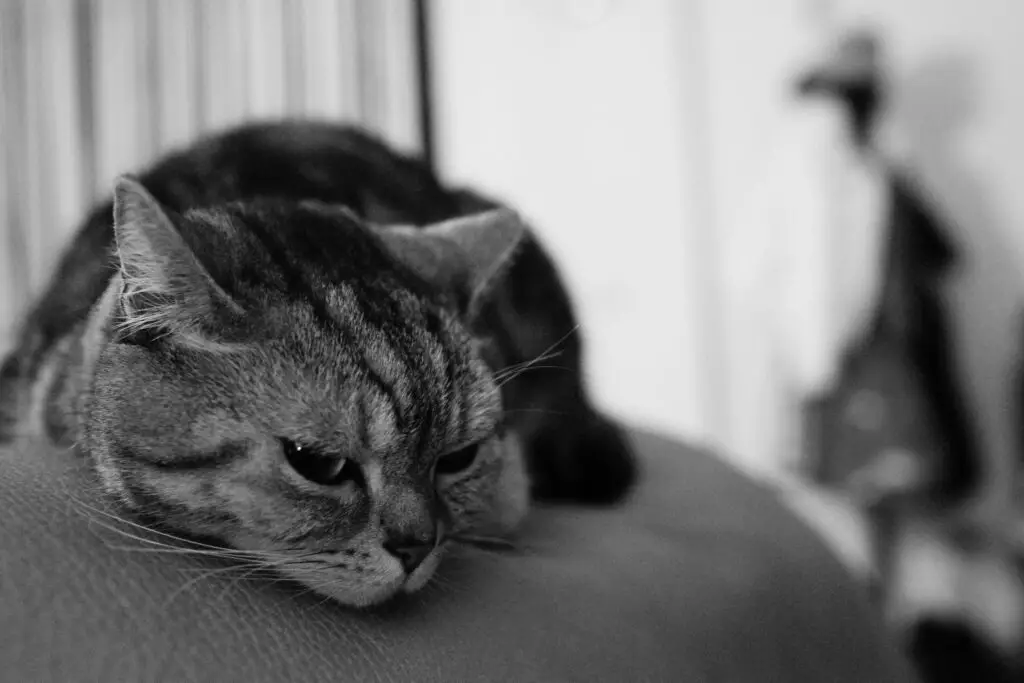Cats are often mysterious creatures and their behavior around death can be hard to interpret. Do cats mourn the death of other cats?
The answer is yes, in some cases they do. Cats have been known to form close interpersonal bonds with one another, and when such a bond is broken, cats may show signs of mourning.
- Key Takeaway
- Do Cats Know If Another Cat Has Died?
- Do Cats Mourn Deaths Of Other Cats?
- How Long Do Cats Mourn The Loss of Another Cat?
- Signs That Your Cat Is Mourning
- How To Help a Grieving Cat
- Should I Show The Body of My Dead Pet To My Surviving Cat?
- Should I Get a New Pet To Keep My Cat Company?
- FAQs
- Q: How do cats grieve the loss of another cat?
- Q: How can I help my grieving cat?
- Q: Can getting another cat help a grieving cat?
- Q: Do cats know when another cat has died?
- Q: Are there any signs of grief that I should look out for in my cat?
- Q: Is there any pet bereavement support service available for pet parents?
- Q: How long does it take for a cat to grieve the loss of another cat?
- Q: Can cats mourn the loss of animals other than cats?
- Q: Are there any organizations that study and help animals grieve?
- In Conclusion
Key Takeaway
- Research and observations indicate that cats can and do mourn the deaths of other cats, often exhibiting behavior changes such as decreased appetite, loss of energy, seeking more attention, or appearing unaffected, though the extent of their understanding of death and their reactions can vary widely.
Do Cats Know If Another Cat Has Died?

Yes, research indicates that cats do have an awareness when another cat has died and they can experience grief.
This is often observed through changes in their behavior such as becoming depressed and listless, showing a decreased appetite, and declining to play.
However, the extent of their understanding and their reactions can vary widely from individual to individual.
Some cats may show no signs at all when another cat in the home passes away, particularly if there was no strong bond between them.
Do Cats Mourn Deaths Of Other Cats?

Yes, cats do mourn the deaths of other cats and may stop eating and lose their usual vigor.
It’s also noted that cats can understand that the deceased will not be returning, but they may not grasp the concept of death in the same way humans do.
In multi-cat households, the death of one cat can result in surviving cats exhibiting less inhibition and seeking more attention from their owners.
The mourning process varies among cats, much like it does among humans, and can depend on the bond between the cats. Behavior changes are common indicators of grief in cats.
How Long Do Cats Mourn The Loss of Another Cat?
Cats can mourn the loss of another cat for varying periods, which could range from a few weeks to several months.
According to studies by organizations, all cats who had lost a companion were observed to return to their normal behavior within six months.
It’s important to note that each cat’s grieving process is unique and can depend on factors like their relationship with the deceased cat and their individual personality.
Some cats may appear to wait for the deceased, not fully understanding the permanence of death, while others might show signs of grief like changes in behavior or location preferences.
Signs That Your Cat Is Mourning
Based on various sources, here are some signs that your cat may be mourning:
- Change in appetite: Cats may eat less or not at all when they are grieving.
- Change in energy level: Grieving cats may show less interest in play and other activities.
- Searching for the missing friend: Cats may wander around the house looking for their deceased companion.
- Increased clinginess or affection: Some cats may follow their owners around more than usual.
- Loss of interest in surroundings: Some cats may seem to become depressed and lose interest in their environment.
- Excessive vocalizing, and pacing: These could be signs of a cat trying to find a loved one who has passed away.
- Changes in sleep patterns: Grieving cats may sleep more or less than usual.
- Unsettled, restless behavior: Cats may seem uneasy and wander around aimlessly.
- Increase or decrease in confidence: Some cats may become more withdrawn, while others may become more demanding of attention.
- Behavior changes such as retreating, hiding, or acting out: Some cats may hide more or begin misbehaving, such as knocking things over or urinating outside the litter box.
How To Help a Grieving Cat
- Spend Quality Time with Your Cat
- Keep Their Routine the Same
- Reward Good Behavior and Ignore the Bad
- Enrich Their Environment
- Talk to Them
- Play Music
- Try Calming Remedies
- Help Fill the Void
Spend Quality Time with Your Cat
Spending time with your cat can help them cope with their grief. This could involve petting them more often, playing with them, or simply sitting next to them. Cats tend to feel secure and comforted when they are near their owners.
Keep Their Routine the Same
Cats thrive on routine, so try to keep their daily activities as consistent as possible. This includes feeding times, play times, and bedtime. Routine can provide a sense of security and normalcy for a grieving cat.
Reward Good Behavior and Ignore the Bad
Cats may exhibit unusual behavior while they’re grieving, such as vocalizing without provocation. It’s recommended to reward good behavior and ignore the bad. This helps the cat understand what behavior is acceptable and what isn’t.
Enrich Their Environment
Offering new toys and treats may help reduce your cat’s newfound clinginess. Hiding treats around the house for them to find can also provide some much-needed distraction and stimulation.
Talk to Them
While cats may not understand human language, they can pick up on your emotions. Talking to them in a soothing voice can help comfort them. Try to stay positive around your grieving cat.
Play Music
Playing music, particularly uplifting, faster tempos, can help lift a cat’s mood. Music can have a calming effect on cats and help them relax.
Try Calming Remedies
There are various calming remedies available for cats, such as Feliway diffusers or calming treats. These can help soothe a cat’s anxiety and make them feel more comfortable.
Help Fill the Void
If your cat has lost a companion, you could consider introducing a new pet to help fill the void. However, this should be done carefully and gradually, as it could potentially stress the grieving cat.
Should I Show The Body of My Dead Pet To My Surviving Cat?
Yes, allow your surviving cat to see the body of a deceased pet because this can help them understand that their companion is gone and may reduce their need to search the house or call out for the missing pet.
However, it’s important to monitor your cat during this process, as every cat can react differently. Some might sniff or nudge the deceased pet, while others might ignore it.
After a while, most cats will come to understand that their companion has passed away.
Should I Get a New Pet To Keep My Cat Company?
Getting a new pet to keep your cat company after the loss of another can be a good idea, but it largely depends on your surviving cat’s personality and how they are coping with the loss.
Allow your cat time to grieve and adjust to the loss. If you do decide to introduce a new pet, do so gradually and in a controlled manner to ensure both animals feel safe and comfortable.
It’s also recommended to consult with your vet or a pet behaviorist for guidance on introducing a new pet into your home.
FAQs
Q: How do cats grieve the loss of another cat?
A: Cats may exhibit behavioral changes, such as loss of appetite, increased vocalization, or withdrawal when grieving the loss of another cat.
Q: How can I help my grieving cat?
A: You can help your cat cope with the loss by providing them with extra attention, creating a calm and comforting environment, and sticking to their routine as much as possible.
Q: Can getting another cat help a grieving cat?
A: Introducing a new cat may help a grieving cat by providing them with companionship and a distraction from their grief. However, it is important to give your cat enough time to grieve before considering getting another pet.
Q: Do cats know when another cat has died?
A: Cats have a keen sense of smell and may be able to detect the scent of a deceased cat. They may also pick up on changes in the household and the absence of the other cat.
Q: Are there any signs of grief that I should look out for in my cat?
A: Some common signs of grief in cats include loss of appetite, changes in sleep patterns, increased vocalization, withdrawal, or changes in litter box habits.
Q: Is there any pet bereavement support service available for pet parents?
A: Yes, there are pet bereavement support services and counseling available for pet parents who are grieving the loss of their beloved companion animal.
Q: How long does it take for a cat to grieve the loss of another cat?
A: The grieving process for cats can vary, and it may take weeks or even months for a cat to fully process and grieve the loss of their companion cat.
Q: Can cats mourn the loss of animals other than cats?
A: Cats may mourn the loss of other animals with whom they had a close bond, such as another pet or a companion animal from a different species.
Q: Are there any organizations that study and help animals grieve?
A: Yes, organizations like the Companion Animal Mourning Project and the American Society for the Prevention of Cruelty to Animals (ASPCA) conduct research and provide support for animals and their owners during times of pet loss and grieving.
In Conclusion
It is evident that cats can experience a range of emotions after the death of another cat.
Cats have been known to display signs of grief, such as depression, reduced appetite, and restlessness.
While it’s impossible to know exactly what a cat is thinking, it’s important to provide them with affection and support during this difficult time.





Leave a Reply